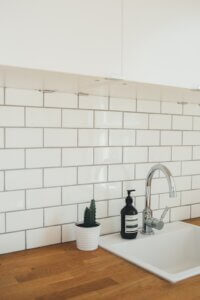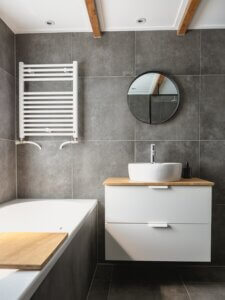The Best Mould Removal Techniques for Hard Surfaces
The Best Mould Removal Techniques for Hard Surfaces
Key Takeaways
- Vinegar as a Natural Remedy: Vinegar is highly effective in killing up to 82% of mould species, making it a safe and natural choice for cleaning mouldy surfaces.
- Use of Baking Soda: Baking soda works well for scrubbing mould without damaging hard surfaces due to its mild abrasiveness.
- Hydrogen Peroxide’s Effectiveness: Hydrogen peroxide serves as a powerful antifungal and antiviral disinfectant, suitable for most hard surfaces.
- Commercial Products for Severe Mould: For stubborn mould infestations, stronger commercial mould removal products can be necessary and effective when used according to instructions.
- Importance of Preventive Measures: Regular cleaning, maintaining low humidity, and ensuring proper ventilation are critical strategies to prevent mould growth on hard surfaces.
Summary
This article details effective mould removal techniques for hard surfaces, emphasizing natural solutions like vinegar and baking soda, alongside hydrogen peroxide and commercial products for tougher cases. It stresses the importance of using protective gear and maintaining a dry, well-ventilated environment to prevent mould growth. Regular cleaning and preventive measures are highlighted as essential strategies to keep mould at bay.
Mould can be a persistent problem in homes and businesses, particularly on hard surfaces where it not only detracts from the appearance but can also cause health issues. Understanding the most effective methods for removing mould from these surfaces is crucial for maintaining a clean, healthy environment. In this comprehensive guide, we explore a variety of techniques to tackle mould on hard surfaces, ensuring that you have the knowledge and tools to effectively deal with this common issue.
Understanding Mould on Hard Surfaces
Mould thrives in moist environments and can quickly become a nuisance on hard surfaces such as tiles, glass, and countertops. These surfaces, while seemingly easy to clean, can harbour mould spores in grout lines, under sinks, and in other damp areas. It’s important to identify the type of surface affected and the extent of the mould growth before choosing an appropriate removal strategy.
Essential Supplies for Mould Removal
Before you begin the mould removal process, ensure you have the following supplies on hand:
- Protective gear (gloves, mask, goggles)
- Soft brush or sponge
- Bucket or container for mixing cleaning solutions
- Commercial mould removal products or natural cleaning solutions (e.g., vinegar, baking soda)
Effective Mould Removal Techniques
1. Vinegar Solution: A Natural and Effective Cleaner
Vinegar is an excellent natural cleaner that can kill up to 82% of mould species. To use vinegar for mould removal:
- Fill a spray bottle with white distilled vinegar.
- Spray the vinegar directly onto the mouldy surface.
- Let it sit for an hour to penetrate and kill the mould spores.
- Wipe the area clean with water and dry it thoroughly to prevent mould from returning.
2. Baking Soda and Water Paste
Baking soda is mildly abrasive and can be used effectively to scrub mould off hard surfaces without causing damage.
- Mix one part baking soda with five parts water to create a paste.
- Apply the paste to the mouldy area.
- Scrub the surface with a brush or sponge.
- Rinse with water and dry the area thoroughly.
3. Hydrogen Peroxide: A Powerful Disinfectant
Hydrogen peroxide is an antifungal and antiviral agent that is safe for most hard surfaces.
- Mix a solution of 3% hydrogen peroxide with water in a 1:1 ratio.
- Spray the solution onto the mould and wait 10 minutes.
- Scrub the mould away with a soft brush.
- Wipe the area clean and dry it thoroughly.
4. Commercial Mould Removal Products
For severe mould problems, commercial mould removers can be effective. These products often contain stronger ingredients designed to tackle stubborn mould growth.
- Follow the manufacturer’s instructions for application.
- Ensure the area is well-ventilated during use.
- After applying the product, allow it to sit for the specified time before scrubbing or rinsing.
- If you’re dealing with a mould infestation, consider contacting professional mould removal experts.
5. Preventive Measures to Keep Mould at Bay
Prevention is key in the battle against mould. To prevent mould growth on hard surfaces:
- Ensure good air circulation and reduce humidity levels in your home or office.
- Use dehumidifiers and air conditioners to maintain a dry environment.
- Regularly clean and inspect potential mould hot spots, such as bathrooms and kitchens.
Regular Maintenance: The Key to Mould Control
Regular cleaning and maintenance of hard surfaces are vital to prevent mould growth. Weekly cleaning with mild cleaners can prevent the accumulation of mould spores and keep your surfaces shining and hygienic.
Mould on hard surfaces can be effectively managed with the right techniques and a bit of diligence. By understanding the nature of the mould and using appropriate cleaning methods, you can ensure that your surfaces remain clean and mould-free. Remember, the best defence against mould is a good offence—regular cleaning and preventive measures.
Why Choose AllAces?
AllAces Cleaning & Restoration has over 35 years of industry experience handling extensive mould removal projects across Brisbane, Sydney, Melbourne and surrounds. Our IICRC-certified technicians are highly trained and experienced utilising the latest technology and equipment to ensure the return of a pre-loss condition.


